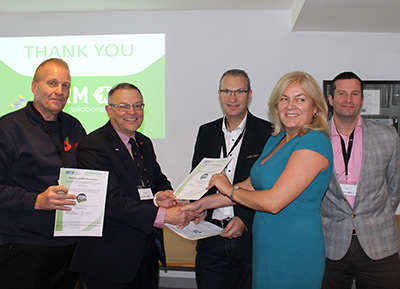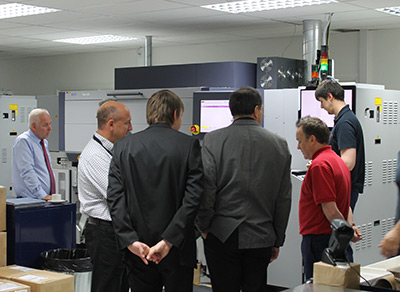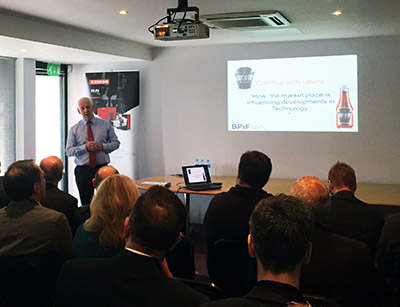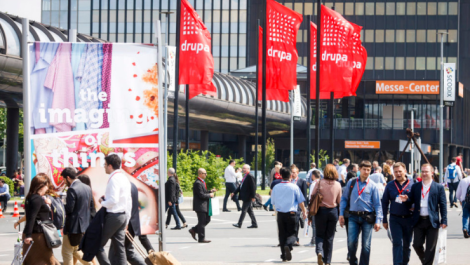David Webster, managing director, The Label Makers, shared his experience of the changes in the market
‘How the market place is influencing developments in technology’ was the topic at BPIF labels’ autumn seminar, held in cooperation with Xeikon on 2 November.
Hosted by The Label Makers in Bradford, the event saw 50 suppliers and converters gather for a ‘Catch up with labels’. As well as the host and sponsor, presentations came from GEW, Cerm, Avery Dennison, and Flint Group Narrow Web.
Managing director of The Label Makers, David Webster, spoke about how the market has changed the way the printing company operates today. He said, ‘The whole market has changed enormously to just in time production, smaller orders and more SKUs. Whereas in the old days, we would print 100,000 of the same shampoo label, we are now looking at 5 to 7 SKUs and volumes of just 10,000 or 20,000 labels. Then the re-print will have a flash added or taken off, so the runs become even smaller, but the supermarkets still want the smaller amount of labels at the same price.’
To meet these demands, the company established a digital department in 2011 when it installed its first Xeikon label press. This was followed by two Durst inkjet machines, one in 2013 and the second in 2015, and in January this year, the Xeikon 3000 was replaced by a new CX3 press. The fleet of digital presses is complemented by two ABG finishing lines, a Digicon 3 and a Digicon Lite.
In terms of volume, digital account for 20% of print, so conventional printing is still a big part of what The Label Makers do, said Mr Webster in conclusion. ‘And until digital can produce metallics, can print faster and becomes cheaper, then there is still a place for flexo.’

John Bambery, BPIF labels (second left), and Jon Hutton, Prismm Environmental (right) presenting the first ever Zero 2 Landfill certificates to David Hirst of PPL (left), Vince Hughes, Interket UK, and Zenna Parfaniuk, The Label Makers
Full integration
Filip Weymans, vice president of marketing at Xeikon, spoke about the importance of automation and the company’s developments in digital embellishment, such as tactile varnish, foiling and Braille. He said, ‘We are looking to create a digital production line, with the press and finishing equipment fully integrated.’ He emphasised the importance of connecting the converting equipment with an MIS in order to understand what is happening in the production system and to optimise it. ‘All processes need to communicate with each other,’ he said. ‘It’s about a changing market space and how you react to it.’
Explaining the benefits of UV LED, Marcus Greenbrook, international sales manager at GEW, said that the technology has picked up faster in the US, with more partnerships between press manufacturers and ink OEMs. Customers there are also more prepared to speak about having integrated UV LED than their European counterparts. Another difference is the fact that there are still many water-based narrow web presses in the US and many simply skip the step of moving to traditional UV curing and go straight to LED.
In Europe, most label presses are UV arc curing and there seems to be a perceived risk associated with UV LED. This has been addressed by GEW through its hybrid curing technology which enables converters to install a system that can be switched from UV to UV LED as and when needed. Mr Greenbrook concluded, ‘To fully optimise your press, you need to have both arc and LED curing technology capability.’
Using the GB cycling team at the Olympics as an analogy, Andrew McKerlie, business development UK and Scandinavia at Cerm, talked about incremental improvements and how each link in the production chain plays a vital part in optimising the overall performance. The MIS is the hub of all information and through automation, it is possible to go virtually paperless – eg job sheets are created from the sales order and there is no more re-entry of the same information at several points. Estimating, scheduling and impositioning are also handled fully by the system, which will recommend the press to be used and report back. This all means cost and time savings; for example saving three minutes per job is equivalent to an increase in efficiency of 20%, explained Mr McKerlie. Summing up, he said, ‘If you want go faster stripes on your Xeikon press, come and talk to us.’
Following a presentation on moving flexo platemaking in house with ThermoFlexX by Bart Wattjin, Niklas Olsson, global brand manager, Flint Group Narrow Web, spoke about UV LED inks – their compatibility and use. He said that converter experiences have been very positive, highlighting benefits such as the much longer lamp life. ‘We strongly believe that UV LED technology has merit and we want to demonstrate the benefits,’ he stated.
The final presentation came from David Torley, technical sales support manager at Avery Dennison, who looked at substrates optimised for digital printing of labels and packaging. He discussed the challenges and advantages around their suitability for both electrophotography and inkjet digital printing. The company has a vast portfolio, which includes over 150 facestocks for Xeikon presses.

Networking
During lunch, there was plenty of opportunity to see The Label Makers’ digital department in action as it was running live jobs throughout the event. The attendees asked questions and spoke to the press operators, as well as Mr Webster, who was happy to discuss his portfolio and the difference between the two types of digital presses and the jobs they print best.
The event also saw the first Zero 2 Landfill certificates handed out to three label companies: The Label Makers, Pharmaceutical Packaging Leeds Ltd and Interket UK. These were presented by BPIF labels chairman John Bambery together with Jon Hutton from Prismm International – the two driving forces behind the scheme, which is designed to reduce the amount of production waste going to landfill by diverting it to energy recovery.
Finally, John Bambery announced that he will retire at the end of March 2017 and that BPIF labels is looking to recruit a new chairman.






